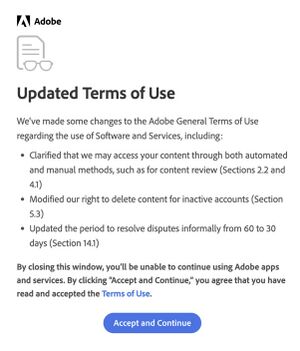Adobe's ToS update gives the company rights over consumers' works
⚠️ Article status notice: This article has been marked as incomplete
This article needs additional work for its sourcing and verifiability to meet the wiki's Content Guidelines and be in line with our Mission Statement for comprehensive coverage of consumer protection issues.
This notice will be removed once sufficient documentation has been added to establish the systemic nature of these issues. Once you believe the article is ready to have its notice removed, please visit the Moderator's noticeboard, or the discord and post to the #appeals channel.
Learn more ▼

Adobe made changes to the terms of use of their software offerings in 2024 using wording that granted Adobe a license to make use of the users' created content in a variety of ways.
Background
[edit | edit source]Adobe, a computer software company that specializes in programs for content creation, editing, and publishing, has stirred controversy with an update to their Terms of Service (ToS) which declares that by accepting, users grant Adobe a "non-exclusive, worldwide, royalty-free license"[1] to their content. This license allows Adobe to "reproduce, distribute, create derivative works, publicly display, publicly perform, and sublicense" the user's content.[1]
Consumer impact
[edit | edit source]This controversy stems from concerns that the updated ToS may violate existing non-disclosure agreements (NDAs) and their own Intellectual property rights[citation needed]. When the change to the policy was made, users were unable to access their content without first agreeing to the updated ToS, leaving many users unable to retrieve their work[citation needed].
While Adobe claims they do not use your content to train generative AI[citation needed], Adobe does admit they may use your content for machine-learning purposes, and states that users always have the option to opt out[citation needed]. There is no option on the ToS-acceptance screen to decline or opt out.
References
[edit | edit source]- ↑ 1.0 1.1 "Adobe General Terms of Use Section 4.3". Adobe. 18 June 2024. Archived from the original on 16 Feb 2025. Retrieved 19 Feb 2025.
